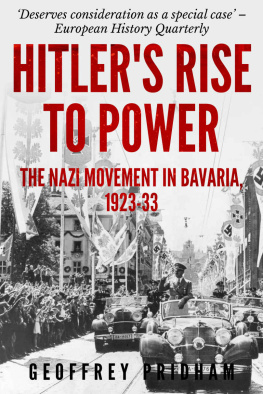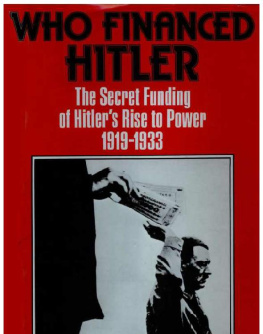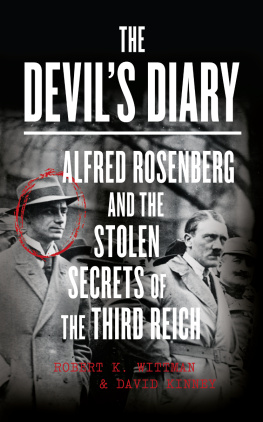Geoffrey Pridham - Hitler’s Rise to Power : The Nazi Movement in Bavaria, 1923–1933
Here you can read online Geoffrey Pridham - Hitler’s Rise to Power : The Nazi Movement in Bavaria, 1923–1933 full text of the book (entire story) in english for free. Download pdf and epub, get meaning, cover and reviews about this ebook. City: New York, Allemagne, Bavaria (Germany), Bavière (Allemagne), Array, Germany--Bavaria., year: 1974, publisher: Harper & Row, genre: Politics. Description of the work, (preface) as well as reviews are available. Best literature library LitArk.com created for fans of good reading and offers a wide selection of genres:
Romance novel
Science fiction
Adventure
Detective
Science
History
Home and family
Prose
Art
Politics
Computer
Non-fiction
Religion
Business
Children
Humor
Choose a favorite category and find really read worthwhile books. Enjoy immersion in the world of imagination, feel the emotions of the characters or learn something new for yourself, make an fascinating discovery.
- Book:Hitler’s Rise to Power : The Nazi Movement in Bavaria, 1923–1933
- Author:
- Publisher:Harper & Row
- Genre:
- Year:1974
- City:New York, Allemagne, Bavaria (Germany), Bavière (Allemagne), Array, Germany--Bavaria.
- Rating:4 / 5
- Favourites:Add to favourites
- Your mark:
- 80
- 1
- 2
- 3
- 4
- 5
Hitler’s Rise to Power : The Nazi Movement in Bavaria, 1923–1933: summary, description and annotation
We offer to read an annotation, description, summary or preface (depends on what the author of the book "Hitler’s Rise to Power : The Nazi Movement in Bavaria, 1923–1933" wrote himself). If you haven't found the necessary information about the book — write in the comments, we will try to find it.
Hitler’s Rise to Power : The Nazi Movement in Bavaria, 1923–1933 — read online for free the complete book (whole text) full work
Below is the text of the book, divided by pages. System saving the place of the last page read, allows you to conveniently read the book "Hitler’s Rise to Power : The Nazi Movement in Bavaria, 1923–1933" online for free, without having to search again every time where you left off. Put a bookmark, and you can go to the page where you finished reading at any time.
Font size:
Interval:
Bookmark:
Hitlers Rise to Power
The Nazi Movement in Bavaria 1923-33
Geoffrey Pridham
Copyright Geoffrey Pridham 1973
The right of Geoffrey Pridham to be identified as the author of this work has been asserted by him in accordance with the Copyright, Designs and Patents Act, 1988.
First published in 1973 by Hart-Davis, MacGibbon Ltd.
This edition published in 2016 by Endeavour Press Ltd.
To my mother
Table of Contents
Abbreviations
Regional and local authorities
BA Bezirksamt (district office)
LA Landratsamt
P.D. Polizeidirektion (Police headquarters)
Mfr. Mittelfranken (Middle Franconia), e.g. Reg. v. Mfr. = Government of Middle Franconia
Niedb. Niederbayern (Lower Bavaria)
Obb. Oberbayern (Upper Bavaria)
Ofr. Oberfranken (Upper Franconia)
Opf. Oberpfalz (Upper Palatinate)
Schw. Schwaben (Swabia)
Ufr. Unterfranken (Lower Franconia)
HMB Halbmonatsbericht (fortnightly report), e.g. HMB/Mfr.
Political parties and organizations
Apa Agrarpolitischer Apparat
BBMB Bayerischer Bauern- und Mittelstandsbund
BVP Bayerische Volkspartei
CNBL Christlich-Nationale Bauern- und Landvolkspartei
DAP Deutsche Arbeiterpartei
DDP Deutsche Demokratische Partei
DNVP Deutschnationale Volkspartei
DSP Deutsche Sozialistische Partei
DVFP Deutschvlkische Freiheitspartei
DVP Deutsche Volkspartei
GVG Grossdeutsche Volksgemeinschaft
HJ Hitlerjugend
KPD Kommunistische Partei Deutschlands
NSBO Nationalsozialistische Betriebszellenorganisation
NSDAP Nationalsozialistische Deutsche Arbeiterpartei (Nazi Party)
NSDStB Nationalsozialistischer Deutscher Studentenbund
NSFB Nationalsozialistische Freiheitsbewegung
NSVB Nationalsozialistischer Volksbund
SA Sturmabteilung
SPD Sozialdemokratische Partei Deutschlands
SS Schutzstaffel
Uschla Untersuchungs- und Schlichtungsausschuss
VB Vlkischer Beobachter
Archives
AR Alte Reichskanzlei
ASA Allgemeines Staatsarchiv, Munich
BSA Bayerisches Staatsarchiv
GSA Geheimes Staatsarchiv, Munich
HA Hauptarchiv der NSDAP, e.g. HA 2/25 = Hauptarchiv Reel 2, Folder
Preface
This book originated in my wish to examine the Nazi rise to power in depth and to provide new insight into this unique phenomenon. My choice of a regional study settled on Bavaria because this offered important new aspects of the problem, and because the partys development here has been neglected, although Munich remained the seat of party headquarters and in spite of the vast amount of material on the subject. The origins of the NSDAP in Bavaria have been the subject of several studies, but not its development there from a small party into a mass movement. This book is based largely on unpublished material. Details of archival sources used are supplied at the end of the book together with a list of secondary works which have helped me.
Although the acknowledgments in the text are to recorded evidence, I owe a great debt to many persons in both England and Germany during the course of my work. Professor F. L. Carsten supervised my thesis and gave me the benefit of his invaluable advice and sympathetic understanding. Dr Jeremy Noakes originally encouraged me to do a study on Bavaria, and our common interest in the subject has since extended to cooperation in another work on the Nazi period. I am particularly grateful to the staffs of the various departments of the Bavarian State Archives in Munich, Nuremberg, Bamberg, Landshut, Amberg, Neuburg a.d. Donau and Wrzburg. I would like to thank especially Dr Hermann-Joseph Busley of the Hauptstaatsarchiv, Munich, for his assistance and advice with my work over many years, as well as Freiherr Fritz von Rehlingen, Dr Sebastian Hiereth, Dr Reinhard Seitz, Dr Hildebrand Troll, Dr Otto Puchner, Dr Eberhard Weis, Dr Scherzer, Dr Scherl, Dr Berndl, Herr Kreuzer, Herr Wunschel and Frulein A. H. Bayer for their patience in answering my numerous requests.
I owe a further debt to Dr Anton Hoch and the staff of the Institut fr Zeitgeschichte for their expertise and help during my many visits to Munich, and would also like to thank Frulein Kinder and the staff of the Bundesarchiv Koblenz for their assistance, Mr K. Hiscock of the Foreign Office Library, London, for providing me with additional material and Herr Gnther Buttman for permission to read the Nachlass Buttmann. I visited several town archives in Bavaria and would like to mention in particular Dr Gustav Wulz (Nrdlingen), Dr Hirschmann (Nuremberg), Dr S. Hofmann (Ingolstadt) and Herr Weikmann (Kaufbeuren) with whom I discussed my work. I would like to give my warm thanks to the entire staff of the Institute of Contemporary History and Wiener Library, London, with whom I had the pleasure of working for two years, and to Professor Walter Laqueur especially for his invaluable help. The Central Research Fund of London University provided me with two generous grants to visit Germany during the summers of 1968 and 1970, while the Colston Research Fund of Bristol University also gave me financial assistance.
Several friends and colleagues have given me help at various stages in my work. I am very indebted to Mr Martin Crouch, who read through the final manuscript and provided me with useful and often incisive comments, and Mr Charles Gray, Mr P. G. James, Herr Klaus Sieveking and Mr Anup Ray, who read an earlier version of the manuscript. I also benefited from discussions with Herr Rainer Hambrecht and Mr T. L. Jarman, and would like to thank Miss Suzanne Sproston for assisting with the progress of the manuscript at different stages. My greatest personal debt is to my mother, who gave me much encouragement over the years and first inspired me with the urge to learn.
I wish also to thank Mr Michael Sissons, my literary agent, for his advice during the production of this book. I am also grateful to Mrs Tina Shell, Mrs Anne Merriman and Mrs Jan Nicholas for typing the final manuscript.
Geoffrey Pridham
One Bavaria and the Weimar Republic
This is a case study of the organization, propaganda and popular appeal of the Nazi movement (NSDAP) in Bavaria from the Munich Putsch in 1923 to Hitlers appointment as German Chancellor in 1933.
There is always a certain unique quality about any case study, but its relevance depends on the reasons for which it is selected and how far it is representative of the general problem with which it is dealing. The merit of a case study is that it should provide new insight into this general problem through the medium of detailed illustration and analysis.
The NSDAP was a mass movement without precedent in German history. One can only fully understand its rise to power, which has so far been examined mainly at the level of national politics, if a sufficient number of regional and local studies are made available. As the NSDAP developed unique methods of popular agitation, it is essential to examine how it operated at the grassroots level. General histories inevitably focus on the more dramatic events of national politics, but a case study pays more attention to particular examples and different situations. While throwing new light on the general problem, it should guarantee against too superficial an interpretation of it by providing a more realistic picture.
Bavaria has become known as the birthplace of the Nazi Party. The party was founded early in 1919 in Munich, which remained the centre of its activities during its early years and became the scene of Hitlers abortive attempt at a coup dtat in the autumn of 1923. When the party reappeared in 1925 after a period of prohibition, Munich continued as the seat of its headquarters and later earned the Nazi title of capital of the movement ( Hauptstadt der Bewegung ). Hitler, who had moved to Munich from his native Austria shortly before the First World War, showed a strong affinity with Bavaria which remained with him through the years of the Third Reich, when he often preferred to spend weekends at his mountain retreat near Berchtesgaden rather than in the more stringent atmosphere of Berlin. Nuremberg, the other major city in Bavaria, became the traditional site of the party rallies.
Next pageFont size:
Interval:
Bookmark:
Similar books «Hitler’s Rise to Power : The Nazi Movement in Bavaria, 1923–1933»
Look at similar books to Hitler’s Rise to Power : The Nazi Movement in Bavaria, 1923–1933. We have selected literature similar in name and meaning in the hope of providing readers with more options to find new, interesting, not yet read works.
Discussion, reviews of the book Hitler’s Rise to Power : The Nazi Movement in Bavaria, 1923–1933 and just readers' own opinions. Leave your comments, write what you think about the work, its meaning or the main characters. Specify what exactly you liked and what you didn't like, and why you think so.










